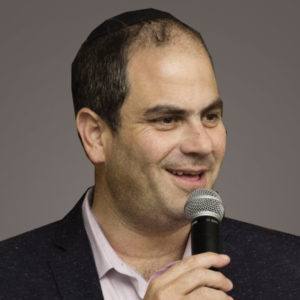
Eli Beer is the founder and president of United Hatzalah of Israel. Beer has been involved in emergency medical first response in Israel since 1988. With 25 years of life-saving experience, he has responded to some of the worst civil, wartime, and terror-related incidents.
United Hatzalah of Israel is an independent, non-profit, fully-volunteer emergency medical services (EMS) organization that provides fast and free emergency medical first response throughout Israel. United Hatzalah is available to all people regardless of race, religion, or national origin.
Q: What inspired you to start United Hatzalah?
When I was seven years old, I witnessed one of the most horrific terrorist attacks in Jerusalem on the #12 bus. There were a lot of people injured and killed in that event. I saw so many people lying on the ground and no one was helping them. I realized that I couldn’t help.
For years, while growing up, I kept wishing I could have helped these people. At 15, I took an EMS course and decided to volunteer in an ambulance. That began my lifelong dream of helping people.
Q: In 2013, you appeared on TEDMED. Please share with us how United Hatzalah volunteers saved more than 40,000 lives in one year in three minutes!
I realized as a volunteer that many people needed help while waiting for an ambulance but didn’t get it in time. I witnessed a seven-year-old child choking. It took the ambulance 21 minutes to arrive but it was too late because the child died. There was a doctor who lived only a block away, but he didn’t know about the situation. Had he known about the boy who was choking, he could have rushed over and saved him, all before the ambulance arrived.
I decided to start a response team in my neighborhood that consisted of 15 volunteers. We would listen for ambulance requests using a police scanner. Our goal was to arrive at the scene of medical emergencies as soon as possible providing the patient with appropriate medical aid until the ambulance arrived. This resulted in many more lives saved.
The first person I saved was a 70-year-old man who was hit by a car. I ran there and discovered he was bleeding from his neck. Using my yarmulke, I applied pressure and stopped his bleeding. With this intervention, I handed over a patient who was alive when the ambulance arrived. Several days later when I visited the man, he gave me a great big hug.
Today we have more than 6,000 volunteers all over Israel available 24 hours a day, seven days a week, 365 days a year. With the help of our unique GPS technology and our iconic ambucycles, our average response time is less than three minutes across the country and 90 seconds in metropolitan areas.
An ambucycle is a motorcycle that is equipped with everything an ambulance has except for the bed. It has an oxygen kit, emergency defibrillator, and more. These volunteers stop what they were doing and jump on their ambucycles to respond to emergencies from either work or home. The ambucylces are very effective at arriving at the scene quickly because they don’t get stuck in traffic. You could call what we do a lifesaving flash mob!
Q: Can you tell us about the time when your father collapsed from a cardiac arrest?
One Shabbos afternoon, my father wasn’t feeling well. I noticed he was pale and didn’t look well. I immediately called an ambulance to take him to the hospital. The next moment, my father collapsed on the floor and stopped breathing. I panicked. Even though I knew how to save a life, I forgot everything that I knew. It was like a bad dream. My wife brought me my medical kit but I couldn’t do anything. She then called for help. In less than two minutes, two United Hatzalah volunteers in the neighborhood arrived. The first volunteer to respond was a Muslim from United Hatzalah in East Jerusalem.
Years earlier, he had approached me to open up a chapter of the organization in East Jerusalem. He had witnessed his own father die from a heart attack while waiting for the ambulance. Together we opened up the branch in East Jerusalem which now has more than 120 volunteers. I felt such gratitude watching him work on my father.
The second volunteer to respond was a Rabbi who had been eating his Shabbos lunch. Together, the Muslim and the Rabbi started to perform CPR on my father. In less than nine minutes, my father regained his pulse and started breathing again. They were able to take him to the hospital and he was saved.
Q: What do you see as your purpose in life?
To make sure that no one dies waiting for an ambulance. If someone needs help he should get it immediately. I always pray to Hashem that no one gets sick or hurt but if they do, I pray to Hashem that our people should get there on time.
Q: Tell us about your experience with COVID-19?
My personal experience was terrible. I met COVID-19 while I was traveling to Miami on a fundraising trip for United Hatzalah. Back in March, no one knew what it was. A few days later I had a fever and I couldn’t breathe. My doctor advised me to go to the hospital. When I arrived, they rushed me into the ICU. I was one of the first patients there. The doctor said he had to put me into a coma. It was the worst experience ever. I thought that I would never wake up again. I had to say goodbye to my five children.
I was in an induced coma for almost 30 days. People all over the world were praying for me. Then a miracle happened, I woke up. I couldn’t believe I was alive. I realized that if it hadn’t been for everyone’s prayers, I would not have survived.
Q: What is United Hatzalah’s biggest challenge?
Probably, the biggest challenge we face is getting people to financially support our work during COVID-19 since so many people have lost their jobs.
Another challenge is the risk that our own volunteers will get sick from COVID-19. With over 2,000 emergencies a day, our volunteers are going into people’s homes who are asymptomatic and unknowingly infected with COVID-19. As a result, our volunteers themselves are exposed and it has happened a few times that they too get sick. It is a big challenge to keep our volunteers safe.
Q: How can we help United Hatzalah?
During this difficult time of COVID-19, we are in desperate need of sponsors and partners. I am available to meet in person (using safety protocols), talk on the phone, Zoom, or Skype to discuss sponsorship and partnership opportunities.
We are looking for Sponsors for a Day of Lifesaving! These sponsors donate money and are partners with us in all of the rescues made that day. They help us reach nearly 2,000 people after the day is over. They receive a detailed list of all the people who enabled us to treat that day. We will also send stories of the more dramatic rescues made.
Choose a birthday, anniversary, or any special day and dedicate it to saving lives! It is the greatest gift you can give, because saving another person’s life, let alone 2,000, is something that is truly incredible.
Some opportunities for partners include buying:
- Oxygen kits
- Emergency defibrillators
- Emergency response ambucycle
- Bulletproof vests, and helmets
Check out their website, www.israelrescue.org/donate, or email them at [email protected].
